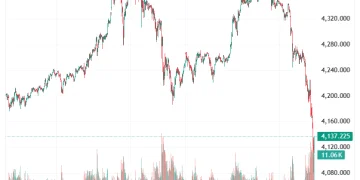Ghana’s Public Debt Burden Laid Bare, Reaching 70.6% of GDP as of June 2024
Ghana’s public debt continues to mount, reaching concerning levels according to the latest data released by the Bank of Ghana. As of June 2024, the country’s total public debt stood at 742.0 billion cedis, equivalent to 70.6% of GDP, up from 69.3% in June 2023.
The increase in the debt-to-GDP ratio comes despite ongoing efforts to consolidate public finances and implement debt sustainability measures. The rise is partly attributed to the persistent depreciation of the cedi, which has inflated the value of external debt when measured in local currency terms.
Breaking down the debt composition, external debt accounted for 452.0 billion cedis or 43.0% of GDP in June 2024, while domestic debt stood at 290.0 billion cedis, representing 27.6% of GDP. The external debt component has seen a notable increase, rising from 38.9% of GDP in June 2023, highlighting Ghana’s growing exposure to foreign currency-denominated liabilities.
The debt situation is further complicated by the country’s challenging fiscal position. For the first half of 2024, Ghana recorded an overall fiscal deficit of 3.4% of GDP, wider than the 1.7% recorded in the same period of 2023. This expansion in the deficit suggests ongoing difficulties in revenue mobilization and expenditure control.
Indeed, while total revenue and grants remained stable at 7.1% of GDP for the first half of both 2023 and 2024, total expenditure increased from 8.7% to 10.5% of GDP over the same period. This widening gap between revenue and expenditure is contributing to the accumulation of debt.
The rising debt levels have implications for Ghana’s debt servicing costs. With domestic interest rates remaining high – the monetary policy rate stands at 29% – the cost of servicing domestic debt continues to consume a significant portion of government revenue.
Moreover, the depreciation of the cedi, which has lost 19.6% of its value against the US dollar year-to-date, increases the burden of servicing foreign currency-denominated debt.
The government has been implementing measures to address the debt situation, including the domestic debt exchange program launched in late 2022. However, the latest figures suggest that more comprehensive and sustained efforts may be needed to bring the debt to sustainable levels.
As Ghana continues to navigate these fiscal challenges, the ability to strike a balance between debt sustainability, fiscal consolidation, and economic growth will be crucial. The coming months will be critical in determining whether the country can reverse the upward trend in its debt-to-GDP ratio and set its finances on a more sustainable path.








